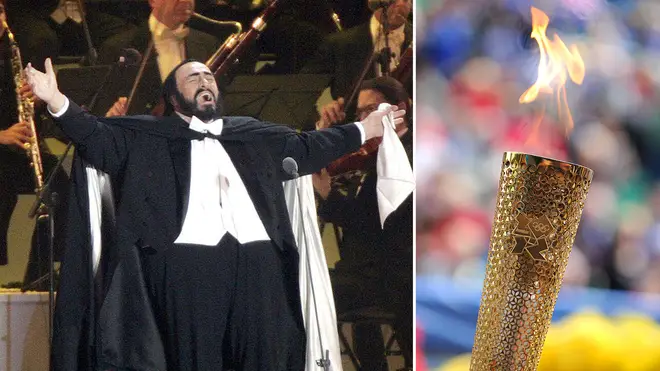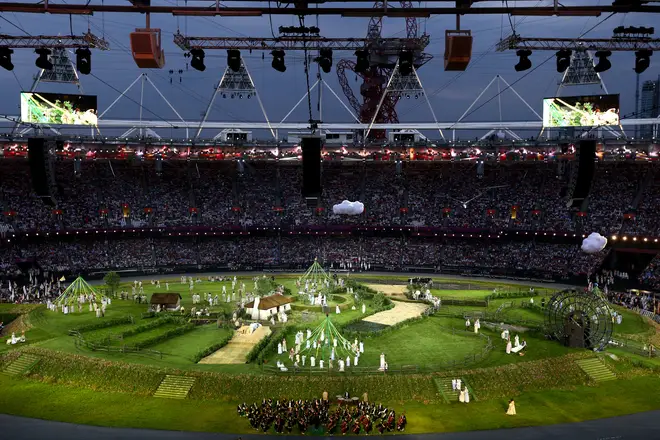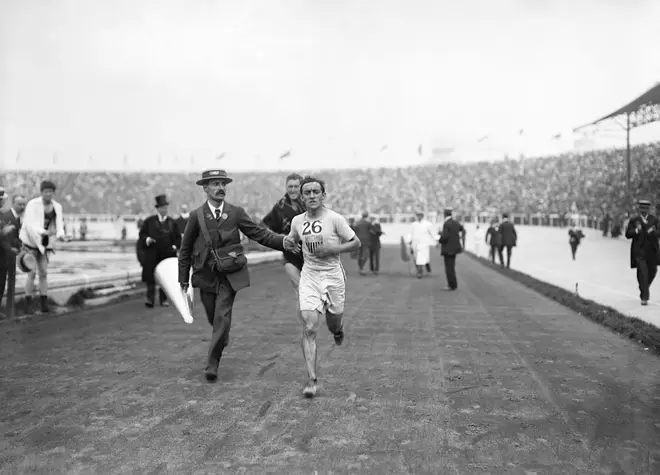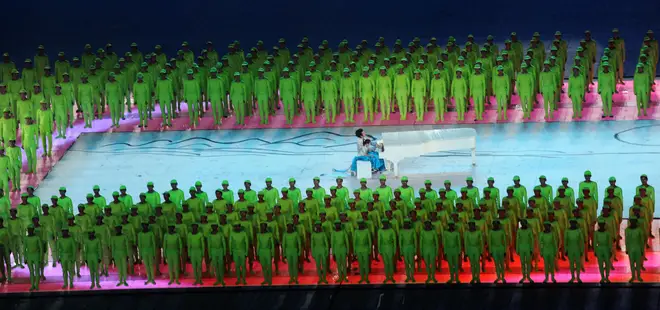On Air Now
Calm Classics with Ritula Shah 10pm - 1am
20 July 2021, 15:44

From fiery orchestral moments in Opening Ceremonies, to iconic, chart-topping duets, we celebrate the most iconic, stage-stealing classical music ever experienced at the Olympics.
The Olympics is as much about the surrounding anticipation, tradition and ceremony as it is the incredible sportsmanship, personal bests and competitive performances demonstrated by the athletes.
And a big part of Olympics buzz is the music and spectacle put on as part of the Olympics Opening and Closing Ceremonies.
The Ceremonies encapsulate the lighting of the Olympic flame, the playing of the Olympic Hymn, and the procession of all nations’ athletes, among other International Olympic Committee (IOC)-determined customs. But they’re also a chance for host nations and their closest friends to showcase the culture, arts and music that are important to them.
And classical music is often at the heart of these global showcases. From Pavarotti’s ‘Nessun dorma’ at Turin 2006, to the London Symphony Orchestra and Sir Simon Rattle’s ‘Nimrod’ at London 2012, we celebrate some of our favourite classical moments seen in Olympic history.
Read more: 12 glorious pieces of classical music inspired by the Olympics
At Italy’s 2006 Winter Olympics, the great tenor Luciano Pavaoritti wrapped his vocal cords around a belting rendition of the aria he’s most famous for: ‘Nessun dorma’, from Puccini’s opera Turandot.
On home turf, the Italian tenor gave a performance that’s gone down as one of the finest and most iconic in Olympic history, being as it was the performance of an Italian piece of music, in a genre defined by Italy, by one of Italy’s most famous sons. A spine-tingling moment.

Luciano Pavarotti - Opening Ceremony Olympics in Italy 2006
A pop-rock icon posthumously joined forces with operatic royalty for the Opening Ceremony of the Barcelona Olympics in 1992.
‘Barcelona’ – which was previously recorded by Queen’s Freddie Mercury and legendary soprano Montserrat Caballé, and performed live by the pair in Barcelona in 1988 when the Olympic flag arrived from Seoul – was played over a montage during the ceremony. Sadly, Mercury passed away before the Barcelona games took place.
The song itself is a splendid display of both genres, and both indomitable vocal talents, doing just what they each do best in tandem. Bravo.

Freddie Mercury & Montserrat Caballé - Barcelona (Live at La Nit, 1988 Remastered)
In 1984, at the Los Angeles Olympics, spectators stadium- and TV-side were treated to a lavish medley of music by George Gershwin, centred around Rhapsody in Blue.
This spectacular version of Gershwin’s beloved jazz symphony was Olympian indeed, with a truly team-sized 84 pianists enlisted to take on the solo piano part. Talk about impressive teamwork…

Los Angeles 1984 || American classic "Rhapsody in Blue"
When the Olympics came home to London in the summer of 2012, the Opening Ceremony showcased the best in British history, culture and music – including the great London Symphony Orchestra, Classic FM’s Orchestra in the City of London, and conductor Sir Simon Rattle.
It was a poignant and proud moment when the orchestra accompanied part of a live onstage montage of pastoral Britain just before it headed into full industrialisation, with a performance of English composer Edward Elgar’s dignified and beautiful ‘Nimrod’ from the Enigma Variations.
Read more: The ‘Olympic Hymn’ was composed for the first-ever Summer Olympics in 1896

In the 1984 Winter Olympic Games in Sarajevo, iconic figure skating pair, Jayne Torvill and Christopher Dean skated to Olympic gold with their spectacular routine set to Ravel’s repetitive and affecting orchestral piece, Boléro.
The music is now somewhat synonymous with ice skating, and it added the right mixture of drama and poise to the household name pair’s winning performance, which has truly gone down in Olympics history.

Torvill and Dean's Relive Their Unforgettable Bolero - Ice Dancing - Sarajevo 1984 | Olympic Rewind
Chariots of Fire was used as the theme for the same 1984 Winter Olympics.
Vangelis’ music was composed for the film of the same name, which tells the true story of Eric Liddell and Harold Abrahams, two British athletes taking part in the 1924 Olympic games to overcome prejudice.
The music is now synonymous with the Olympics, coming to symbolise the struggle, strength and hope that defines the global sporting event.

In 1984, legendary film composer John Williams stepped up to the podium at the Los Angeles Olympics Open Ceremony to conduct his own Olympic Fanfare and Theme, which became the iconic theme of that year’s games and beyond.
For the music, Williams uses the fanfare from Leo Arnaud’s Bugler’s Dream Suite, written in the 1950s, to tie in with US television using the same theme for its 1984 Olympics broadcasts.

Olympic Theme Los Angeles 1984 - John Williams
One of the best and most celebratory choruses in classical music, Handel’s glorious ‘Hallelujah Chorus‘ from the Messiah oratorio featured in the London 1948 Olympic Games.
As it was close to the end of World War Two, British composers and their music were opted for the Olympic festivities in 1948.

Royal Choral Society: 'Hallelujah Chorus' from Handel's Messiah
Pianist Lang Lang took on Chinese composer Xinghai’s Yellow River Cantata at the 2008 Olympic Games in Beijing.
After the world-famous pianist performed this patriotic piece with five-year-old Li Muzi in front of the world, 40 million Chinese children took up piano lessons as part of what is now known as the ‘Lang Lang Effect’.
